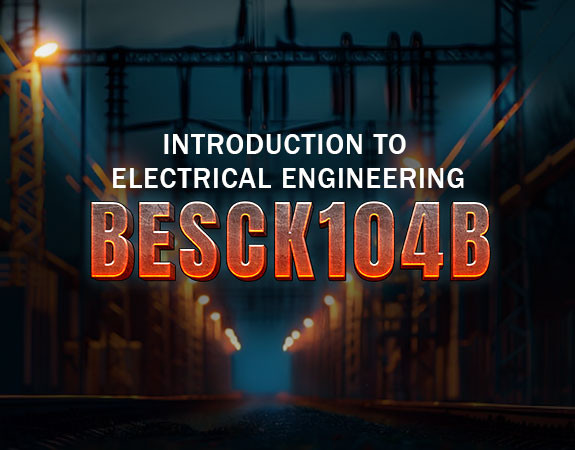What you will learn
-
Provide a blend of theoretical knowledge and practical applications.
-
A solid foundation in electrical engineering
-
Ensure both academic success and industry readiness.
This is a semester-long course designed for undergraduate students seeking a solid foundation in electrical engineering principles. With a curriculum tailored to ensure both academic success and industry preparedness, this course seamlessly blends theoretical knowledge with practical applications. The course begins with an exploration of conventional and unconventional energy sources, as well as power generation and DC systems, providing students with a strong understanding of energy fundamentals. It moves on to cover AC fundamentals and three-phase circuits, ensuring a comprehensive grasp of electrical systems. Core topics like DC machines, transformers, and 3-phase induction motors will equip students with vital knowledge needed for advanced studies and real-world applications. Additionally, the course addresses practical aspects such as domestic wiring, understanding the electricity bill, and equipment and personal safety measures, preparing students for both professional and personal electrical safety.
Introducing the Curriculum and Expectations

"Understanding General structure of electrical power systems using single line diagram approach. "

Understanding Nuclear
"Understanding Solar power generation"
"Understanding Wind power generation"

Series & Parallel Circuits
Kirchhoff''s Current (KCL) & Voltage (KVL) Laws
Set 3 - Concept Testing: Problem 1
Set 3 - Concept Testing: Problem 2
Set 3 - Concept Testing: Problem 3


Set 3 - Numericals: Problem 2
Set 3 - Numericals: Problem 3
Set 3 - Numericals: Problem 4
Set 3 - Numericals: Problem 5
Set 3 - Numericals: Problem 6
Introducing the Curriculum and Expectations
Learning Components
Why Learn A.C Applications - Inspiration
Advantages of Sine wave
AC Power Generation
Introducing the Waveform and observations
Understanding phase
Understanding Definitions - Amplitude, Frequency & Time Period
General Definition for RMS
RMS - Derivation
Use of the concept of RMS

Defining Form & Peak Factors

Set 1 - Numericals - Problem 1
Set 1 - Numericals - Problem 2
Understanding Pure Resistive Circuit
General Expression of Average Power in an AC Circuit
Understanding Pure Capacitive Circuit
Understanding Pure Inductive Circuit
Understanding LRC Circuit, Phasor diagram & Impedence
Understanding RL Circuits
Understanding RC Circuits
Understanding Power Factor


Set 2 - Concept Quizzes: (Quiz 2)
Set 2 - Concept Quizzes: (Quiz 3)
Set 2 - Concept Quizzes: (Quiz 4)
Set 2 - Concept Quizzes: (Quiz 5)
Set 2 - Concept Quizzes: (Quiz 6)
Set 2 - Concept Quizzes: (Quiz 7)
Set 2 - Concept Quizzes: (Quiz 8)
Set 2 - Concept Quizzes: (Quiz 9)
Set 2 - Numericals: Problem 1 (MQP - 2022)
Set 2 - Numericals: Problem 2 (MQP - 2022)
Set 2 - Numericals: Problem 3 (QP - 2023)
Set 2 - Numericals: Problem 3 (QP - 2023) - Alternate Method

Set 2 - Numericals: Problem 5 (Average Power Consumed - Inductor)
Set 2 - Numericals: (Problem 6)
Set 2 - Numericals: (Problem 7 - JEE Adv 2024)
Set 2 - Numericals: (Problem 8 - JEE Adv 2024)
Introduction to three phase voltage form
Three phase circuits - Balanced supply


Set 3 - Numericals - Problem -2
Set 3 - Concept Quizzes: (Quiz 1)
Introducing the Curriculum and Expectations
Principle of Operation - D.C. Generator
Construction of D.C. Generator
Types of Generators


Understanding Shunt Generator (Relation between EMF & Terminal Voltage)
Understanding Series Generator (Relationship between EMF & Terminal Voltage)
Principle of Operation - D.C. Motor
Understanding back EMF and it's Significance
Relation between Torque & Angular Velocity
Expression for Torque Developed be a D.C Motor
Understanding Types of D.C Motors - Shunt & Series
D.C. Motor Characteristics - (Speed Control: Shunt & Series)

Concept Quizzes - Quiz 1
Concept Quizzes - Quiz 2

Concept Quizzes - Quiz 4
Concept Quizzes - Quiz 5
Numericals: Problem 1 (D.C Shunt Motor - MQP 2022)
Numericals: Problem 2 (D.C Shunt Generator - MQP 2022)

Numericals: Problem 4 (D.C Shunt Generator - QP 2023)
Numericals: Problem 5 (Critical Thinking Question)
Numericals: Problem 6 (DC Motor - GATE 2022)
Introducing the Curriculum and Expectations
Necessity of Transformer
Principle of Operations
Construction of Single Phase Transformer and their Types
EMF Equation for a Transformer - Derivation
Transformer Losses and their variation with Load


Set 1 - Numericals: (Problem 2 - MPQ 2021)
Set 1 - Numericals: (Problem 3 - MPQ)
Set 1 - Concept testing - Problem 1
Set 1 - Concept testing - Problem 2
Set 1 - Concept testing - Problem 3
Set 1 - Concept testing - Problem 4
Concept of Rotating Magnetic Field - Holistic Understanding

Types of Rotors - Squirrel Cage & Wound Rotor
Slip & it's significance
Set 2 - Numericals: (Problem 1 - QP 2023)

Set 2 - Numericals: (Problem 3)
Set 2 - Concept testing - Problem 1
Set 2 - Concept testing - Problem 2
Introducing the Curriculum and Expectations
Understanding Wiring Materials

Understanding 2 way control
Understanding 3 way control
Power Rating of Household Appliances

Units of Power Consumption - Basic Example
Understanding the Two-part Electricity Tariff & Calculations
Set 2 - Numericals - Problem 1
Equipment Safety - Working Principle (Fuse)

Personal Safety - Electric Shock (Do's and Don’ts)
Personal Safety - Earthing and it's types

No Discussion Found
0.0
0 Reviews
Meet Your Instructor

₹ 1499.00
-
Course Duration0
-
Course LevelBasic
-
Student Enrolled0
-
LanguageEnglish
This Course Includes
- 0 Video Lectures
- 0 Quizzes
- 0 Assignments
- 0 Downloadable Resources
- Full Lifetime Access
- Certificate of Completion
